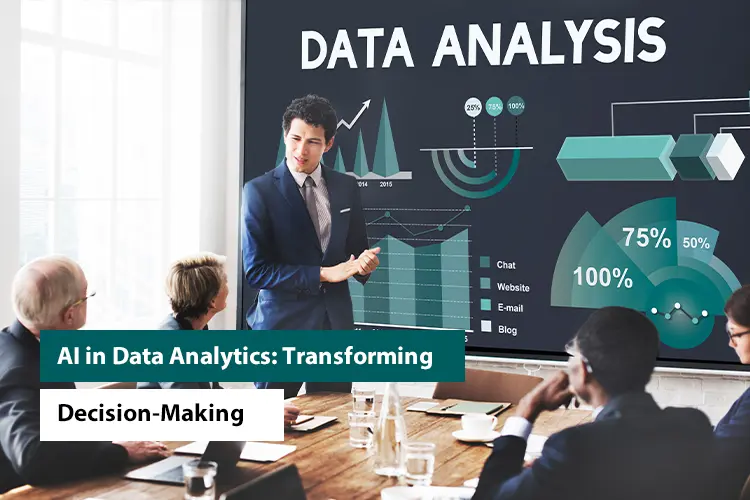AI in Data Analytics: Transforming Decision-Making

Have you ever stopped to wonder just how much data is generated every single day? It’s an astronomical figure—over 2.5 quintillion bytes! Yes, you read that correctly. From social media posts to online transactions, from sensor readings to digital photos, the digital universe is expanding at an exponential rate, inundating organizations with a tsunami of data.
In this era of unprecedented data proliferation, organizations face a monumental challenge: How can they harness this vast sea of information to drive smarter, more informed decisions? Traditional data analytics methods, while valuable, often struggle to keep pace with the sheer volume, variety, and velocity of data flooding into the digital landscape.
Enter Artificial Intelligence (AI), the disruptive force reshaping the landscape of data analytics.
In today’s hyper-competitive and data-driven environment, organizations are not merely swimming in data; they’re striving to navigate its depths to uncover actionable insights that can fuel innovation, optimize operations, and propel strategic growth. According to a report by Forbes, a staggering 97.2% of organizations are investing in AI to enhance their analytics capabilities and gain a competitive edge in their respective industries.
But what exactly is AI bringing to the table, and how is it revolutionizing the way organizations approach decision-making?
In this blog, we’ll embark on an illuminating journey into the realm of AI-powered data analytics, exploring its transformative potential, game-changing benefits, and best practices for implementation. From uncovering hidden patterns to predicting future trends, from automating repetitive tasks to delivering personalized experiences, AI is poised to redefine the very fabric of decision-making in the digital age. So, buckle up as we delve deeper into the dynamic intersection of AI and data analytics, where the possibilities are as vast as the data itself.
Understanding The Role of AI in Data Analytics

Understanding the role of Artificial Intelligence (AI) in data analytics requires a nuanced exploration of how AI techniques and algorithms augment traditional data analysis processes. AI brings a diverse set of capabilities to the table, enabling organizations to extract deeper insights, uncover hidden patterns, and derive predictive models from their data. Here’s a closer look at how AI revolutionizes data analytics:
Automation of Tasks
AI automates repetitive and time-consuming tasks involved in data preprocessing, cleaning, and transformation. By leveraging techniques such as machine learning and natural language processing, AI algorithms can efficiently handle mundane tasks, allowing data analysts and scientists to focus on more strategic activities.
Enhanced Data Processing
AI algorithms excel at processing vast amounts of structured and unstructured data at unprecedented speeds. Whether it’s analyzing customer transaction data, social media interactions, or sensor data from IoT devices, AI-powered analytics platforms can handle diverse data sources with ease, enabling organizations to extract valuable insights from complex datasets.
Pattern Recognition and Prediction
AI algorithms, particularly those based on machine learning, excel at identifying patterns and trends within data. By analyzing historical data, these algorithms can identify correlations, anomalies, and predictive patterns that may not be apparent to human analysts. This predictive capability enables organizations to anticipate future trends, forecast demand, and make proactive decisions to stay ahead of the competition.
Uncovering Insights from Unstructured Data
Traditional data analytics techniques often struggle with unstructured data sources such as text documents, images, and videos. AI-powered natural language processing (NLP) and computer vision algorithms enable organizations to extract valuable insights from unstructured data sources. For example, sentiment analysis can derive customer sentiment from social media posts, while image recognition can identify objects and patterns in visual data.
Real-time Decision-Making
AI facilitates real-time data analysis and decision-making by processing data streams as they arrive. This capability is particularly crucial in dynamic environments such as financial markets, manufacturing processes, and supply chain management, where timely insights can drive operational efficiency and strategic decision-making.
Personalization and Customer Insights
AI enables organizations to deliver personalized experiences and recommendations to customers based on their preferences and behavior. By analyzing customer data and interactions, AI algorithms can segment audiences, predict purchasing behavior, and tailor marketing messages to individual preferences, thereby enhancing customer satisfaction and loyalty.
Risk Management and Fraud Detection
AI-powered analytics platforms are adept at identifying potential risks and anomalies within data, enabling organizations to mitigate fraud, detect cybersecurity threats, and ensure regulatory compliance. By analyzing patterns and deviations from normal behavior, AI algorithms can flag suspicious activities and alert decision-makers to take appropriate actions.
In essence, AI transforms data analytics from a descriptive and diagnostic tool into a predictive and prescriptive powerhouse. By harnessing the capabilities of AI, organizations can unlock the full potential of their data assets, drive innovation, and gain a competitive edge in today’s data-driven landscape.
Benefits of AI in Data Analytics

The benefits of Artificial Intelligence (AI) in data analytics are multifaceted, spanning across various aspects of data processing, analysis, and decision-making. Here’s an in-depth exploration of the key advantages AI brings to the field of data analytics:
Improved Accuracy and Precision
AI algorithms are capable of analyzing vast volumes of data with unparalleled accuracy and precision. By leveraging advanced statistical techniques and machine learning algorithms, AI can identify subtle patterns, correlations, and anomalies within data that may go unnoticed by human analysts. This enhanced accuracy minimizes the risk of errors and ensures that insights derived from data analytics are reliable and actionable.
Faster Insights and Real-time Decision-Making
AI-powered data analytics processes data at lightning speed, enabling organizations to derive insights and make decisions in real-time. Whether it’s analyzing streaming data from IoT devices, monitoring social media trends, or detecting anomalies in financial transactions, AI algorithms can process data streams rapidly and provide timely insights that drive immediate action and response.
Cost Efficiency and Resource Optimization
By automating repetitive and labor-intensive tasks, AI reduces the need for manual intervention in data analytics processes. This not only saves time but also reduces operational costs associated with data analysis. Additionally, AI-powered analytics platforms can optimize resource allocation by identifying inefficiencies, streamlining workflows, and maximizing the utilization of available resources.
Enhanced Decision-Making and Strategic Planning
AI-generated insights empower decision-makers with valuable information and actionable recommendations. By analyzing historical data, predicting future trends, and simulating different scenarios, AI enables organizations to make more informed and strategic decisions. Whether it’s optimizing marketing campaigns, allocating resources, or identifying new business opportunities, AI-driven analytics provides decision-makers with the insights they need to drive business growth and innovation.
Personalized Customer Experiences
AI algorithms can analyze customer data to personalize products, services, and marketing messages based on individual preferences and behavior. By segmenting customers, predicting purchasing patterns, and delivering targeted recommendations, AI-powered analytics enable organizations to enhance customer satisfaction, drive engagement, and foster long-term loyalty.
Risk Mitigation and Fraud Detection
AI-powered analytics platforms are effective in identifying potential risks, threats, and anomalies within data. By analyzing patterns and deviations from normal behavior, AI algorithms can detect fraudulent activities, cybersecurity threats, and compliance breaches in real time. This proactive approach to risk management helps organizations mitigate potential losses, safeguard assets, and maintain regulatory compliance.
Innovation and Competitive Advantage
AI enables organizations to explore new possibilities and uncover insights that drive innovation and competitive advantage. By leveraging AI algorithms to analyze market trends, customer preferences, and emerging technologies, organizations can identify untapped opportunities, develop innovative products and services, and stay ahead of the competition in today’s rapidly evolving business landscape.
AI empowers organizations to unlock the full potential of their data assets, driving efficiency, agility, and innovation in data analytics. By harnessing the benefits of AI, organizations can derive actionable insights, make informed decisions, and achieve their strategic objectives in an increasingly data-driven world.
Best Practices of AI in Data Analytics

Implementing AI in data analytics requires careful consideration of best practices to ensure the effectiveness, reliability, and ethical use of AI-powered solutions. Here’s an expanded discussion on the best practices for leveraging AI in data analytics:
Data Quality Assurance
Ensure that the data used for AI-driven analytics is of high quality, relevance, and integrity. This involves data cleansing, normalization, and validation to remove duplicates, errors, and inconsistencies. Organizations should establish data governance policies and procedures to maintain data quality throughout its lifecycle, from acquisition to analysis.
Interdisciplinary Collaboration
Foster collaboration between data scientists, domain experts, business stakeholders, and IT professionals to ensure that AI solutions address real-world problems effectively. Cross-functional teams can bring diverse perspectives and expertise to the table, facilitating the development and deployment of AI-powered analytics solutions that meet the needs of the organization and its stakeholders.
Continuous Learning and Optimization
AI algorithms require continuous training, testing, and optimization to adapt to changing data patterns and business requirements. Organizations should invest in ongoing education and training programs to upskill data scientists and engineers in the latest AI techniques and technologies. Additionally, regular performance monitoring and tuning are essential to ensure that AI models remain accurate, reliable, and relevant over time.
Ethical Considerations and Transparency
Address ethical concerns related to data privacy, transparency, and fairness in AI-driven analytics. Organizations should adhere to ethical guidelines and regulatory requirements governing the collection, use, and sharing of data. Transparency in AI algorithms and decision-making processes is crucial to building trust and credibility with stakeholders. Organizations should also ensure that AI models are free from bias and discrimination and that they prioritize the ethical treatment of sensitive information.
Experimentation and Innovation
Encourage a culture of experimentation and innovation to explore new AI techniques and technologies that can further enhance data analytics capabilities. Organizations should allocate resources for research and development projects focused on exploring emerging AI trends, experimenting with novel algorithms, and piloting innovative use cases. By fostering a culture of innovation, organizations can stay ahead of the curve and leverage AI to drive continuous improvement and competitive advantage.
Scalability and Integration
Design AI-powered analytics solutions with scalability and interoperability in mind to accommodate growing data volumes and evolving business needs. Modular and flexible architectures enable organizations to integrate AI capabilities seamlessly into existing data infrastructure and workflows. Scalable AI platforms can adapt to changing demands and support the deployment of AI models across various business units and use cases.
Read More : How Artificial Intelligence is Revolutionizing Social Media to Drive Higher Engagement
User Education and Adoption
Educate users and stakeholders about the capabilities, limitations, and benefits of AI-powered analytics to foster adoption and maximize value. Training programs, workshops, and knowledge-sharing sessions can help users understand how to interpret AI-generated insights, leverage AI tools effectively, and incorporate data-driven decision-making into their daily workflows. User feedback and engagement are essential for refining AI solutions and driving continuous improvement.
By adhering to these best practices, organizations can harness the full potential of AI in data analytics while mitigating risks and ensuring responsible and ethical use of AI technologies. Effective implementation of AI-powered analytics can drive innovation, improve decision-making, and deliver tangible business outcomes in today’s data-driven landscape.
Conclusion
AI has indeed emerged as a game-changer in the realm of data analytics, revolutionizing the way organizations approach decision-making. With its ability to sift through vast datasets, identify intricate patterns, and deliver actionable insights in real-time, AI empowers businesses to make informed, data-driven decisions with unwavering confidence. Through the adoption of AI algorithms, organizations stand to enhance not only the accuracy and efficiency of their data analysis but also their competitiveness and agility in the ever-evolving landscape of today’s business world.
However, as organizations embark on their AI-driven analytics journey, it’s imperative to tread carefully, adhering to best practices and ethical guidelines to navigate potential risks and pitfalls effectively. By prioritizing data quality, fostering interdisciplinary collaboration, and embracing a culture of continuous learning and innovation, organizations can unlock the full potential of AI in data analytics while safeguarding against biases and ethical concerns.
At Imenso Software, we understand the transformative power of AI in data analytics, and we’re committed to helping organizations harness this potential to drive growth and innovation. With our cutting-edge AI solutions and guidance of data experts, organizations can unlock actionable insights, optimize decision-making processes, and gain a competitive edge in the digital era. So, if you’re ready to embark on your AI-powered analytics journey, partner with Imenso Software and unlock the full potential of your data.
We’re honored to mention that our efforts have been recognized by renowned B2B review and research platforms such as GoodFirms, Clutch, MirrorView, and many more
Want more information about our services?
Similar Posts

Here Is The Secret To Secure Huge Funding For Your App
Apps have made many billionaires in the 21st century. Mark Zuckerberg, Jeff Bezos, Reid Hoffman are just a few of the popular ones. The combination of smartphones and apps has made us addicted to the latter. ...

Why Is Software Development A Need For Businesses In 2022
Take a look everywhere you go, we’re all inundated by software. From basic mobile apps to sophisticated operating systems, everywhere is a type of software. In the last few years, the amount of people who use smartphones and computers has significantly increased. Statistics from the year 2019 indicate that there are a total number of […]...

Everything Your Need to Know About Online Food Ordering System in 2025
The terms “quick commerce”, “Online ordering system” and “on-demand delivery” are buzzwords everywhere. We are also witnessing significant development in the direction of this on-demand economy in the food and restaurant sectors. Today, the online food delivery market is worth billions of dollars. New food delivery services and cloud kitchen startups continue to flourish in […]...








